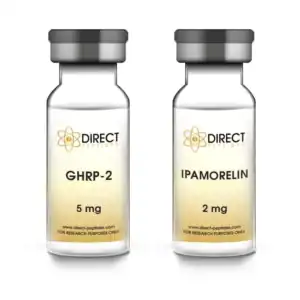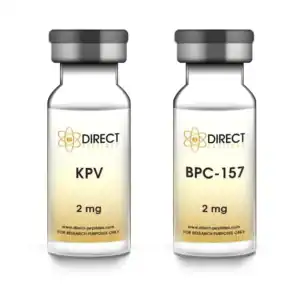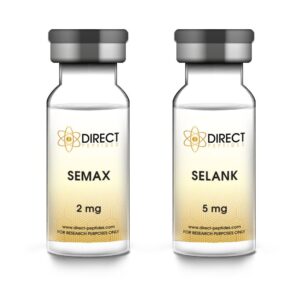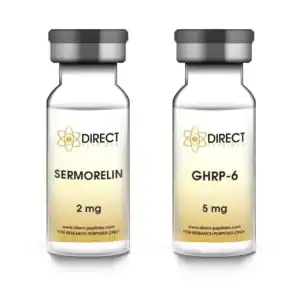£30.50 – £39.48Price range: £30.50 through £39.48
Buy PTD-DBM GHK-Cu Peptide Stack
Using stack PTD-DBM GHK-Cu peptides together offers a unique combination of benefits. PTD-DBM, known for its ability to stimulate hair growth by activating the Wnt/β-catenin signaling pathway, can work in synergy with GHK-Cu, which promotes skin regeneration, wound healing, and collagen production. This combination can potentially provide more comprehensive skin and hair health benefits, enhancing both the look and feel of these areas.
PTD-DBM 1mg | GHK-Cu 5mg
454 in stock
This product is intended for research purposes only. To be used by trained professionals only.
PTD-DBM and GHK-Cu are two potent peptides that, when used together, can provide a powerful regimen for skin and hair health, thus providing anti-aging benefits.
PTD-DBM, or Protein Transduction Domain-Domain Binding Motif, is a peptide recognized for its role in stimulating hair growth. This peptide functions by activating the Wnt/β-catenin signaling pathway, an essential process in hair follicle development and cycling. PTD-DBM interferes with the binding of CXXC5 to Dishevelled (Dvl), an upstream regulator in this pathway.
Estonia Studies have shown that both PTD-DBM-treated and CXXC5 knock-out mice have seen improved hair regrowth by restoring Wnt/β-catenin signalling and proliferation [1]. Furthermore, PTD-DBM has been formulated into a topical scalp treatment that inhibits the follicle shrinking action of the body’s hormones and enzymes.
In addition to being studied for regrowth of hair, PTD-DBM is also used in products designed to halt hair loss and stimulate hair regrowth. Its use in a peptide-based topical scalp treatment has shown promising results, making it a significant player in the field of hair health and restoration.
GHK-Cu, or Copper Tripeptide-1, is a naturally occurring tripeptide known for its potent health benefits, particularly in skin and hair care. It has a high affinity for copper(II), making it a natural chelator.
One of the primary benefits of GHK-Cu is its ability to stimulate collagen, elastin, and glycosaminoglycan synthesis, which are vital for maintaining skin elasticity, firmness, and hydration. Additionally, it encourages blood vessel and nerve outgrowth, which can support tissue regeneration [2].
GHK-Cu is widely used in Estonia skincare products due to its regenerative and protective actions. For example, it’s found in professional skincare serums combined with other beneficial ingredients like Hyaluronic Acid and Aloe Vera, aiming to improve skin health.
Moreover, GHK-Cu has been shown to have anti-aging properties. It promotes skin remodelling, wound healing, and has robust antioxidant and anti-inflammatory effects [3]. It also plays a role in hair growth stimulation, as it helps enlarge hair follicles.
When used together, these peptides can offer a holistic approach to beauty and wellness. The PTD-DBM peptide can help improve hair health and stimulate growth, while GHK-Cu can enhance skin condition by promoting healing, regeneration, and collagen production. Therefore, the combination of PTD-DBM GHK-Cu offers a synergistic effect for those seeking to improve their overall skin and hair health.
[1] https://www.ncbi.nlm.nih.gov/ pmc/articles/PMC9954685/
[2] https://www.ncbi.nlm.nih.gov/ pmc/articles/PMC6073405/
[3] https://www.ncbi.nlm.nih.gov/ pmc/articles/PMC8789089/
PTD-DBM Specifications
Sequence: RRRRRRRRGGGGRK TGHQICKFRKC
Molecular Formula: C124H22N61O28S2
Molecular Weight: 3082.65
GHK-Cu Specifications
Sequence: Gly-His-Lys
Molecular Formula: C14 H24 N6 O4
Molecular Weight: 340.384 g/mol
Purity: >98%
Storage: Lyophilized peptides stored below -18°C.
PTD-DBM GHK-Cu Peptide Stack is for Research Use Only. Not for human or animal consumption!
ALL CONTENT AND PRODUCT INFORMATION AVAILABLE ON THIS WEBSITE IS FOR EDUCATIONAL PURPOSES ONLY.
DISCLAIMER: These products are intended solely as a research chemical only. This classification allows for their use only for research development and laboratory studies. The information available on our Estonia Direct Peptides website: https://direct-peptides.com is provided for educational purposes only. These products are not for human or animal use or consumption in any manner. Handling of these products should be limited to suitably qualified professionals. They are not to be classified as a drug, food, cosmetic, or medicinal product and must not be mislabelled or used as such.
BUY PTD-DBM GHK-Cu Peptide Stack ONLINE today From Estonia Direct Peptides

GHRP-2 Ipamorelin Peptide Stack
£21.51 – £30.51Price range: £21.51 through £30.51 This product has multiple variants. The options may be chosen on the product page
BPC-157 KPV Peptide Stack
£22.59 – £31.57Price range: £22.59 through £31.57 This product has multiple variants. The options may be chosen on the product page
Semax Selank Peptide Stack
£29.50 – £38.42Price range: £29.50 through £38.42 This product has multiple variants. The options may be chosen on the product page
Sermorelin GHRP-6 Peptide Stack – Vial Stack